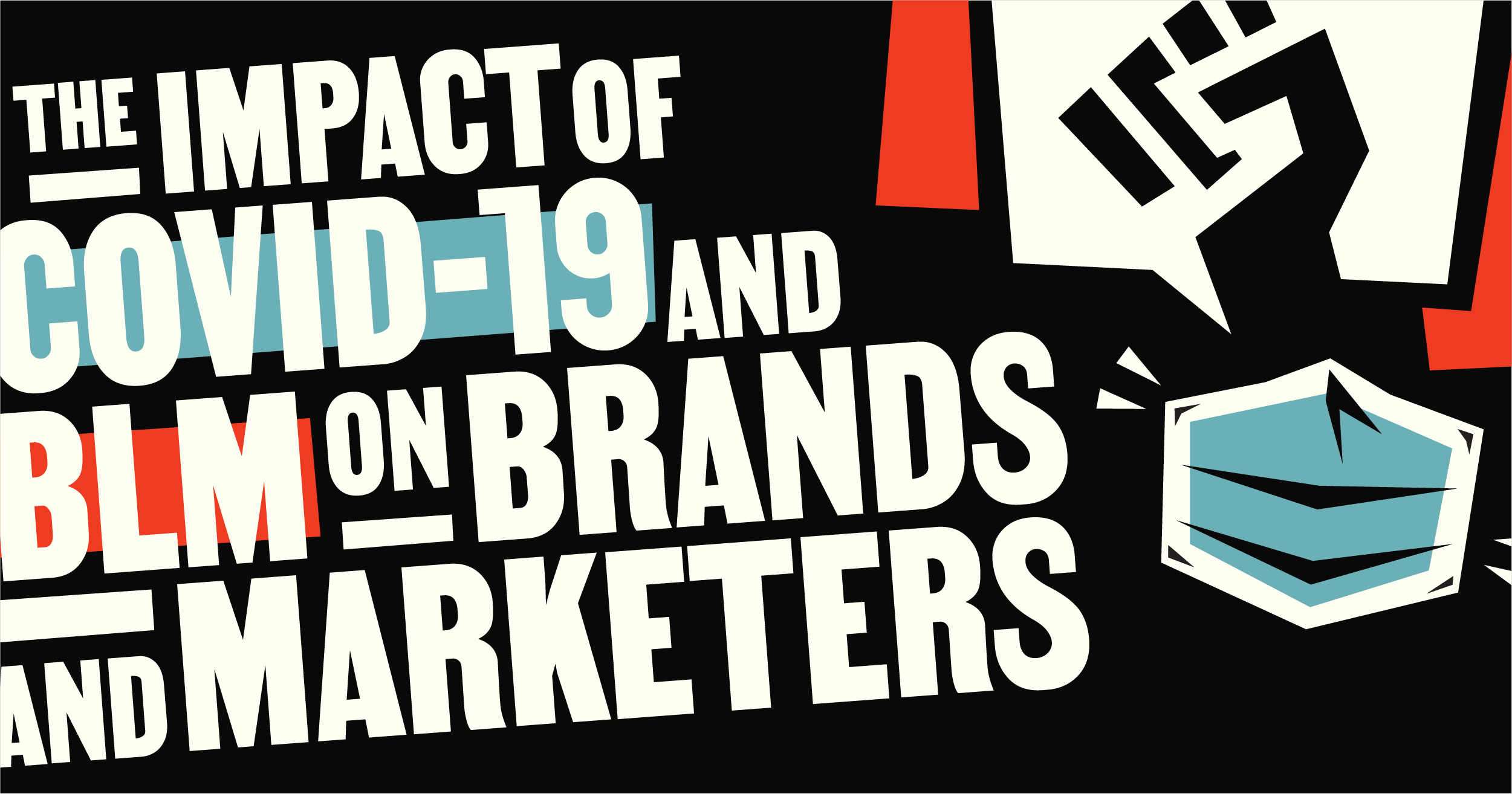Brands Taking a Stand: 7 Takeaways from a Candid Conversation about COVID and BLM

This year, the world changed forever--including the world of advertising and marketing. Brands and agencies are being held responsible in ways we never have before. Consumers are demanding that we uphold the interests of the greater good. It started with COVID-19. Then, the killing of George Floyd and the Black Lives Movement raised awareness of how systemic racism impacts our world, and called for us all to play a role in society beyond commerce.
How have marketers and brands risen to the call? Execs and inclusion and diversity managers from Twitter, Starbucks, Facebook, Brookdale Senior Living, Nebo and Hawkeye Agency gathered this week to answer that question. In a webinar hosted by American Marketing Association Atlanta, Atlanta Interactive Marketing Association and Nebo, these experts discussed the ways in which brands are becoming a force for good, from reimagined hiring processes to tying corporate pay to diversity initiatives.
Here are seven takeaways from industry leaders on the ways that COVID and Black Lives Matter have impacted brands, and how we can do better as organizations and as individuals.
1. Consumers are demanding more of brands than ever—and that’s a good thing.
In many ways, the coronavirus set us up for a culture where accountability is critical. We all have to do our part to prevent the spread with our individual actions, and sacrifice some of our comforts to do so. Consumers began to question brands’ reactions to COVID in March. Was their tone and messaging appropriate? How did they treat employees and service workers?
James Loduca, Twitter’s senior director of global inclusion and diversity, pointed out that this same accountability-focused scrutiny easily translated to the call for accountability in regards to antiracism and inclusivity in June. People expect brands to speak up against injustice--and then put their money where their mouth is.
“Consumers and employees are looking to brands to be a moral agent and be on the right side of history,” says Andrew McCaskill, cultural and economics contributor of Sirius XM and diversity and inclusion specialist at Facebook. “We’re all building some muscle memory around that. We’re building that plane while we’re flying it.”
2. Brands expect more from agencies, too.
Joe Demiero, CEO of Dallas-based Hawkeye agency, noticed a growing trend this year: just as consumers are holding corporations accountable, so too are corporations putting pressure on their partners to align on values.
“Almost all of our new clients this year have given Hawkeye a diversity and inclusion evaluation to ensure it’s not just a page in our Powerpoint,” says Demiero. “They want to see real action and know that it’s a value of ours. It’s about who we surround ourselves with and hold our partners accountable as well.”
3. When disruption happens, communication is key.
“When COVID hit, our leadership had to transform our whole business overnight,” says Kristin Puckett, director of social media strategy at Brookdale Senior Living. When so much is in flux, brands need to over-communicate to consumers--and social becomes much more than a marketing tool.
“Communication with communities, residents and their family members was absolutely critical during his time,” says Puckett. “Social media actually became a very valuable tool for us. Each community has its own Facebook page. Family members really turned to social media for updates on how each community was keeping residents safe.”
For Loduca of Twitter, it’s important that brands communicate the context of new actions and decisions. “A commitment to fighting issues has to be authentic. It has to be appropriately contextualized,” he says. “At Twitter, we elevate voices of black creators and artists and activists. We continue the conversations in our walls with talks by dr. Ibram Kendi and others. Our words and backed up by the context and track record of our actions.”
Loduca also offers advice to those organizations that are relatively new to publicly taking a stand. “Let’s say your company wants to do something, but doesn’t have a track record. It’s never a bad time to start. You don’t have to have a track record. You just have to contextualize it. Tell people what led you to this moment, why it matters to you and your organization.”
4. In the face of uncertainty, put people first. Then, iterate.
As marketers, we have what often feels like unlimited data and insights at our fingertips--that is, until we don’t. This year presented many unprecedented moments, which left everyone feeling shaken, including marketers.
“Oftentimes we have the luxury of having industry knowledge backed by history. We didn’t have that luxury with the outbreak,” notes Haley Malgieri, associate director of strategy at Nebo. “As a result there was a lot of soul searching — what should I do or shouldn’t I do as a brand? As a human being? When we acted from a human perspective, an empathetic perspective, we really started to see positive reactions and engagement.”
As we adapt to a “new normal,” Malgieri says it’s crucial that brands continue to do research throughout the year, then make iterative improvements. “As we’ve seen, there are crazy twists and turns to the pandemic and all the events in 2020. How consumers behaved two weeks ago can be markedly different from how they behave two weeks from now. Keep a pulse on things and make iterative changes.”
5. Reimagine the hiring process.
In September, the CEO of Wells Fargo was criticized--and rightfully so--for blaming a lack of diversity in hiring on a “limited pool of Black talent.”
According to Zing Shaw, chief inclusion and diversity officer of Starbucks, a lack of diversity indicates a lack of creative thinking about the hiring process. “If you know that your industry is highly homogenous, and you look only to your industry for diverse talent, you need to look for new ways to find talent,” Shaw says. That could mean considering adjacent industries, or looking for candidates who have different experiences and backgrounds with skills that are transferable to your industry.
“Go to new and unexpected places for hiring, because trust me,” Shaw says, “there is no shortage on the talent.”
6. New forms of accountability are key.
Starbucks recently made headlines for its new program that ties executive compensation to inclusion and diversity outcomes. The company faced scrutiny from some, but Shaw says, “No one is getting an incentive to do the work. We’re starting with a deduction if you don’t do the work. We’re finding out what people are made of and what they’ll put on the line to do this work when your salary and bonuses are on the line. We’re willing to put our own salaries on the line to ensure this work is getting done.”
For Andrew McCaskill of Facebook, accountability is about the difference between putting money on an issue and doing the work for real change.
“For a lot of companies, their checkbook is their superpower,” says McCaskill of Facebook.
“If it is, you should be writing a really big check. But most important is having a 360-degree approach. If you’re going to invest in social justice, you should also invest in figuring out how the brand shows up in marketing. When you segment, how do you have a reciprocal relationship between the brand and the people who bolster the brand? Now is the time to start building a relationship with communities that has a modicum of reciprocity to it.”
“That’s the only way that any of this works,” McCaskill adds. “It’s great to write big checks, but for some of the biggest brands in the industry, some organizations won’t take a check from you unless you’re looking at diversity in a holistic way.”
7. Get comfortable with being uncomfortable.
One of the biggest takeaways of the panel is this: change is hard, and diversity and inclusion are uncomfortable topics. That discomfort isn’t going to change--but that doesn’t mean we give up. Instead, that’s where leaning into discomfort pays off, and where the importance of building trust comes in.
“Trust allows for us to make mistakes because our intentions are clear. But when actions don’t back up intentions, trust erodes,” says Loduca.
“We will make mistakes on this journey, and that’s okay,” adds Shaw. “It’s okay to fail if we’re failing forward.”

Comments
Add A Comment